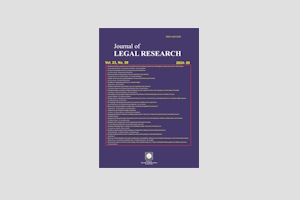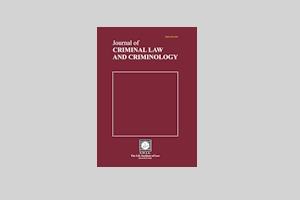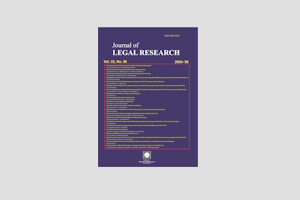Journal of
LEGAL RESEARCH
Number 38
Vol. XVIII ● No. 2
Summer 2019
Managing Editor: Vahid Eshtiagh
Editor-in-Chief: Seyyed Ghasem Zamani
CONTENTS
Articles
Attorney’s Criminal Liability
Dr. Bizhan Hajiazizi & Seyyedeh Maryam Etemad
Conflict between Public Interests of the Community and the Individual Interest of the States: Transition from the Principle of Immunity in the Light of the Development of International Criminal Law
Dr. Hoorieh Hosseini Akbarnezhad
Access to Sufficient Food as a Human Right in the Legal System of World Trade Organization with the Emphasis on Transgenic Food
Dr. Najmeh Razmkhah
A Criticism of Article 137 of Islamic Criminal Law regarding Crime Recidivism
Azadeh Ghorbani & Arezoo Ghorbani
The Problem-Oriented Policing and Fear of Crime
Dr. Seyyed Mahdi Seyyedzadeh Sani & Saeed Kermani
The Interaction of Territorial Integrity with Rights and Legitimate Freedoms under Domestic and International Law
Dr. Hedieh Sadat Mirtorabi & Dr. Sobhan Tayebi
Reduction Process of Capital of Corporation in Iran and UK Laws
Hamid Shali
Legal Analysis of Mobile Number Portability in Iran, in the Light of Comparative Studies
Seyyed Hashem Maddah Hosseini & Rajab Fallahi & Sara Mortezagholi
Effects of the Disclaimer or Limitation of Liability Clauses in Iranian Law with a Review in the English Legal System
Dr. Hojjat Mobayen & Amin Amirhosseini
The Mechanisms for Protecting the Right to Use the Mother Tongue in International and National Institutions: Review on International Jurisprudence
Dr. Seyyed Ghasem Zamani & Farhad Abedini Saadabad
The Privilege against Self-Incrimination in International Courts; (ICC, ICTY, ICTR)
Alireza Gharaghani
Articles
Attorney’s Criminal Liability
Dr. Bizhan Hajiazizi
Associate Professor, Faculty of Literature and Human Science, University of Bu-Ali Sina, Hamedan, Iran
Seyyedeh Maryam Etemad
Ph.D. Student of Private Law, Faculty of Law, Theology and Political Science, Science and Research Branch, Islamic Azad University, Tehran, Iran
Abstract:
The agency contract is one of the specific contracts which has basic role in society and people’s relationships. Advocacy as a proof of contract of attorney ship is so important from the respect of proving the right of offended person. A large number of rules and technical arbitration on the one hand and lack of familiarity of all the people in the community with these affairs on the other hand, causes the need to have attorney in the society. Naturally the attorney is not only responsible for his client, but also he has responsibility towards the community and his guild system, this issue is worth considering from civil, criminal, and security aspects. Although the issue that will be analyzed in this paper is attorney’s criminal liability, sometimes as a number of society and sometimes as an “attorney of justice administration”; so the attorney can be committed public offenses that will be responsible just as ordinary (other) people (public criminal liability) and also he can be held accountable for crimes which legislator has criminalized for them – attorneys of justice administration. In the latter case he will be convicted to the penalty provided by law (particular criminal liability). Vs there are some cases due to lack of foresight of sanction, attorney’s action will be without any criminal liability. Met as (being) a “lawyer” follows a responsibility under the title “professional responsibility” that is applied sometimes alone, sometimes in parallel criminal liability and sometimes after achieving it.
Keywords: Agency, Responsibility, Criminal Liability, Attorney.
Conflict between Public Interests of the Community and the Individual Interest of the States: Transition from the Principle of Immunity in the Light of the Development of International Criminal Law
Dr. Hoorieh Hosseini Akbarnezhad
Assistant Professor, Faculty of Law, Tarbiat Modares University, Tehran, Iran
Abstract:
Public interest of International community is one of the most important issues of modern International Law, and it is superior to private interest of individual states. The basis of this superiority is the common values and interest of international community as a whole. To protect and insure of the public interest of international community implies the limitation of individual interest of states. Elimination of impunity causes the establishment of international criminal courts. The goals of International Criminal Law have restricted the principle of impunity and International Criminal Law based of the responsibility and accountability in response to the International crimes. One of the most important issues in the Modern International Law is arranging the conflict between public interests of the community and the individual interest of the states.
The purpose of International Criminal Law is protection of the victims of gross and serious violations of International Human Rights Law and International Humanitarian Law. The advent of the jus-cogense and erga-omnes obligations has caused some limitations on the absolute immunity and sovereignty of the states in International Law since recent decades, but for more developments, we should expect in future.
Keywords: International Criminal Law, States, Impunity, Public Interest.
Access to Sufficient Food as a Human Right in the Legal System of World Trade Organization with the Emphasis on Transgenic Food
Dr. Najmeh Razmkhah
Assistant Professor of Law, Payame Noor University, Iran
Abstract:
In the framework of International Human Rights, the right to adequate food is a fundamental right of everyone to access to food which is safe and nutrient. Therefore safety is main subject in trade of food productions, the case which has not been proved about transgenic foods. With attention to position of World Trade Organization (WTO), in food trade, examination of the WTO obligation about safety of foods is very important. So that the main question is about the legal base of WTO obligation to ensure the right to adequate food. In this article it has been shown that despite the absence of obvious provision about human right to adequate food in agreements of WTO, but WTO is impliedly obliged to respect this rights and standards about safety and risk assessment of food.
Keywords: Transgenic Food, World Trade Organization, Right to Adequate Food, Food Safety, SPS Agreement.
A Criticism of Article 137 of Islamic Criminal Law regarding Crime Recidivism
Azadeh Ghorbani
Ph.D. Student, Department of Criminal Law and Criminology, The Faculty of Human Science and Law, Islamic Azad University, Isfahan (Khorasgan) Branch, Isfahan, Iran
Arezoo Ghorbani
Ph.D. Student, Department of Criminal Law and Criminology, The Faculty of Human Science and Law, Islamic Azad University, Isfahan (Khorasgan) Branch, Isfahan, Iran
Abstract:
In the present study which has been carried out in a descriptive and analytical way, it is proposed that though Islamic Criminal Law, approved in 1392, contains a lot of changes and innovations, we cannot ignore some faults in some of its articles. One of these articles is article 137 regarding crime recidivism in Ta`zirat crimes. In the first glance, this issue may doesn’t become bold, but after attention and delicacy and referring to article 137, we can point out that not correcting this fault can lead to quandary and variance of opinions. What the authors are following in the present study is to investigate Ta`zirat punishments regarding deprivation of social rights of the sentenced which if a person after the date of definity of arbitrate until political rehabilitation commits a crime, the laws of crime recidivism will be applied to him/ her.
Keywords: Islamic Criminal Law, Offenses Sentenced, Article 137, Recidivism, Rehabilitated.
The Problem-Oriented Policing and Fear of Crime
Dr. Seyyed Mahdi Seyyedzadeh Sani
Assistant Professor Department of Law, Faculty of Economics and Administrative Sciences, Ferdowsi University of Mashhad, Mashhad, Iran
Saeed Kermani
Master Criminal Law and Criminology, Islamic Azad University of Mashhad, Mashhad, Iran
Abstract:
We can define fear of crime as an emotional reaction characterized by a sense of danger and anxiety produced by the threat of crime. The dynamics of fear of crime is a multi-faceted phenomenon, but you cannot say that all type of it is considered as a treat. Analyzing and reducing fear of crime is increasingly considered to be a police task in lots of countries. There are three kind of policing: classical, community based and Problem-Oriented Policing. Problem-Oriented Policing (POP), coined by Herman Goldstein, is a policing strategy that involves the identification and analysis of specific crime and disorder problems, in order to develop effective response strategies. For years police focused on the “means” of policing rather than it’s “ends”. Goldstein called to replace what he termed the reactive, incident-driven “standard model of policing”. Based on this theory SARA model for problem solving was expanded. In SARA, “Scanning” is the first step and require police identifying and prioritizing potential problems in their jurisdiction. Second step is analyzing the problem. The third step, response, has the police develop and implement interventions designed to rectify the problems. The final step is assessment, which involves evaluating the impact of the response and what good has been accomplished. In this article it was tried to look at the problem of fear of crime with this approach.
Keywords: Problem-Oriented Policing, Policing Methods, Fear of Crime, Crime Prevention.
The Interaction of Territorial Integrity with Rights and Legitimate Freedoms under Domestic and International Law
Dr. Hedieh Sadat Mirtorabi
Ph.D. in Public Law, Tehran University, Iran
Dr. Sobhan Tayebi
Ph.D. Environmental Law, Faculty of Law, Theology and Political Science, Islamic Azad University, Science & Research Branch, Tehran, Iran
Abstract:
Today, independence and territorial integrity of the country as a universal principle and interest will be emphasized .United Nations, international law and the constitution, strongly support such a view. According to various principles of the constitution, national unity and territorial integrity, independence, Islamic Republic of Iran is considered a necessary condition. For this reason, the ninth constitution of liberty, independence, unity and territorial integrity of our inseparable and maintaining it is the duty of the state and nation by nation knows. Iran’s territorial integrity and international borders, the highly respected and public support and its abuses, constitutes an infringement of the public authority. On the other hand, the acceptance and recognition of the rights of ethnic groups and tribes in the country, shall not impair the sovereignty or secession from the local area. The third season of the Iranian constitution inspired by the principles of Islamic Thought, a variety of fundamental freedom sand protecting people’s attention has .Detailed explanation of the relationship between freedom, independence, unity and territorial integrity can avoid the appearance of arbitrariness and dependency analysis, effective and lead society towards achieving happiness.
Keywords: Territorial Integrity, Legitimate Freedoms, Fundamental Rights, Sovereign Principle, Challenge and Strategy.
Reduction Process of Capital of Corporation in Iran and UK Laws
Hamid Shali
Master of Arts of Private Law, Faculty of Law and Political Sciences, Allameh Tabataba’i University, Tehran, Iran
Abstract:
Some measures must be observed in the reduction of capital of corporation, including changes in the corporation’s investment. Notice of the process of reducing for implementing legally of the measures is obvious.
Capital reduction in Iran’s law may be mandatory or arbitrarily and the reasons which require the reduction is different. Each of organs of corporation is involved in the reduction process. In Iran’s law the capital reduction take place with recommendation of board of directors, the specials report of auditors and the decision of the Extraordinary General Assembly, but according to British law, Capital reduction may be take place due to a special resolution of the General Assembly or in the court decisions.
The general assembly at the time of adoption of capital reduction shall consider some circumstances, including, observing Restrictions concerning the minimum amount of capital reduction, equality of shareholder’s rights and observing creditors’ rights.
In this article which is used from a descriptive-analytical method, the Iran’s law, as far as possible, will compare and explain with UK’s laws.
Keywords: Change of the Capital, Corporation, Process of the Capital Reduction, UK’s Corporation’s Laws.
Legal Analysis of Mobile Number Portability in Iran, in the Light of Comparative Studies
Seyyed Hashem Maddah Hosseini
Facutly Member of ICT Research Institute (Iran Telecommunication Research Center), Tehran, Iran
Rajab Fallahi
Facutly Member of ICT Research Institute (Iran Telecommunication Research Center), Tehran, Iran
Sara Mortezagholi
Master of Telecommunications Law, Faculty of Law and Political Sciences, Allameh Tabataba’i University, Tehran, Iran
Abstract:
The development of technologies associated to mobile phone, and, also increase of customers’ demands to take advantage from the foresaid technologies have led to new technologies on mobile phone. One of the most considerable technologies is to transfer the mobile operator, without any number portability. This issue is known significant; because there are some customers who cannot exchange their SIM card because of number importance, although they may not be satisfied of their operator. Since to achieve more economic profits and, growth of competition in telecommunication markets are known as goals of said prerogative, the economic aspects have influenced, so notably, on regulation and legal requirements of the technology. Hence, regarding to the significance of the legal aspects of the event, to which it’s been referred, in this article the legal aspects of technology are being analyzed. Both legal frameworks identified mandatory by the regulatory authority and considering regulation methods on the technology are analyzed in this article. Moreover, since this issue is known young in Iran, the legal aspects of the technology in Iran have been studied.
Keywords: Number Portability, Mobile Phone, Legal Frameworks of Tariff, Regulatory.
Effects of the Disclaimer or Limitation of Liability Clauses in Iranian Law with a Review in the English Legal System
Dr. Hojjat Mobayen
Ph.D. in Private Law, Assistant Professor, Faculty of Law and Political Science, Shiraz University, Shiraz, Iran
Amin Amirhosseini
Ph.D. Student of Private Law, Faculty of Law, Shahid Beheshti University, Tehran, Iran
Abstract:
In this article we will study effects of the clause for eliminate or reduce liability in relations between two parties, and also with third parties. This type of clause reduces or eliminates contractual liability of the agent of damage, except in cases of violation of public order that this clause will be considered invalid. These clauses are effective in the tortious liability, provided that the clause is expressly encompassed the fault and does not violate a jus cogens; this theory has been accepted also in the English Law. In relation to the third parties, the agent of damage who is the successor in the contract, could reliance on the exclusion clause against the aggrieved party, based on the theory of “Third-party beneficiary” or “subrogation”. The exclusion clause should be reliable on against third parties who can’t prove the fault of the agent of damage, except by reference to the contract.
Keywords: Contract Liability, Tortious Liability, Exclusion Clause, Public Order.
The Mechanisms for Protecting the Right to Use the Mother Tongue in International and National Institutions: Review on International Jurisprudence
Dr. Seyyed Ghasem Zamani
Professor at International and Public Law Department, Faculty of Law and Political Sciences, Allameh Tabataba’i University, Tehran, Iran
Farhad Abedini Saadabad
Ph.D. Student in Public International Law, Faculty of Law and Political Sciences, Allameh Tabataba’i University, Tehran, Iran
Abstract:
The right to use the mother tongue is influenced by examination of this right in international human right. In fact, speaking of language right requires review of nature of this right in general human right framework and minority rights, on the one hand the right to use of mother tongue is rooted in “right to be different” that derived from human dignity, and on the other hand, given the majority language rights are well-established in different ways than minority language rights, right to use of mother tongue needs to be studied in minority rights. Thus, according to the importance of mother tongue, language rights can be divided and evaluated in toleration oriented approach that prohibits government of any intervention towards select and use of language and also promotion oriented approach which seeks to protect the use of mother tongue language in a variety of areas of education, the courts and the public authority. The international mechanisms in relation to language rights play a significant role in the identification, interpretation and implementation of the rights to use of mother tongue. Because in recent years by observing practices of international entities witnessed the transition from negative commentary to positive commentary about minority rights specially language rights. In addition, internal courts in this field have considerable potential and in this way can be effective in extending and developing of right to use of mother tongue.
Keywords: Mother Tongue, Minorities, International Human Right, International and National Mechanism.
The Privilege against Self-Incrimination in International Courts; (ICC, ICTY, ICTR)
Alireza Gharaghani
Master of Criminal Law & Criminology, Faculty of Law & Political Sciences of Tehran University, Tehran, Iran
Abstract:
The privilege against self-incrimination means that in criminal procedure an accused shall not put himself in position that its result is his conviction; he shall not be compelled to contribute actively in proceedings which will lead to his conviction; whether he was ordered by inspectors to declare facts or produce documents.
Self-incrimination often occurs within accused’s speaking; the question is that, are the privilege against self-incrimination & right to silence the same or not? There are different ideas but it is defendable to say that; the privilege against self-incrimination has wider spread & in addition to acoustic communications, it covers other types of self-incrimination such as produce documents.
This right has been pointed in several international documents such as; “The Universal Declaration of Human Right” & “International Covenant on Civil & Political Rights” & “International Convention on the Elimination of All Forms of Racial Discrimination”.
Statutes & other regulations of international courts (i.e ICC, ICTY, ICTR) has the best standard of accused’s defense rights. The privilege against self-incrimination & other aspects of this right (such as adverse inference) expressly has been anticipated in case law & all provisions of these courts.
Keywords: The Privilege against Self-Incrimination, Adverse Inference, ICC, ICTY, ICTR.





